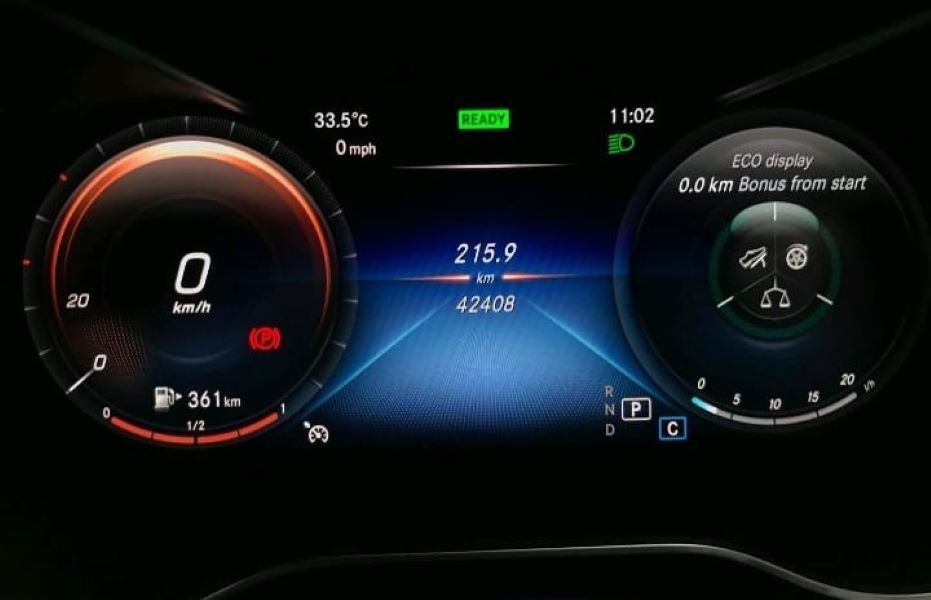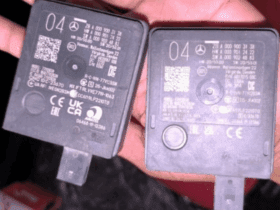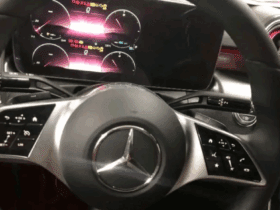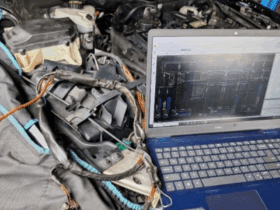Table of Contents
Mercedes Starts and Shuts Off Quickly : Case Study in C-Class 48V EQ Boost
A Mercedes-Benz C-Class W205 EQ Boost equipped with the M264 engine arrived at our workshop with an unusual complaint:
“The car starts, runs for a few seconds, and then shuts off immediately.”
This was not a typical engine fault. The dashboard displayed multiple warnings at once:
- – SOS Inoperative
- – 48V Battery See Owner’s Manual
- – ESP Inoperative See Owner’s Manual
- – Restraint System Malfunction Consult Workshop
Such a combination of errors often points to an electrical network fault rather than a single failed component. What followed was a systematic diagnosis to uncover the real culprit behind this “Mercedes starts and shuts off quickly” issue.
Vehicle Overview
| Model | Mercedes-Benz C-Class W205 EQ Boost |
|---|---|
| Engine | M264 2.0L Turbocharged EQ Boost |
| Complaint | Engine starts briefly, then shuts off |
| Warning Messages | SOS, 48V Battery, ESP, Restraint System Malfunction |
Customer Complaint: Mercedes Starts and Shuts Off Quickly
The customer explained that the vehicle started fine but stalled within seconds.
No unusual sounds were present, and the restart attempt produced the same result.
This type of fault in a 48V EQ Boost system usually suggests a communication or synchronization failure between the 12V and 48V electrical networks.
Step 1: Initial Diagnostic Scan
A complete scan using the Mercedes-Benz XENTRY STAR Diagnosis system was performed.
Fault Codes Retrieved:
- – N83/1 – DC/DC Converter: “Signal fault or missing message.”
- – SRS Control Unit: No communication with diagnostic system.
- – Multiple U-codes (communication errors) across ESP, restraint, and powertrain systems.
The DC/DC converter’s job is to bridge and stabilize voltage between the 48V hybrid battery and 12V electrical systems.
When it fails or when another module disrupts CAN communication the vehicle may start but immediately shut down due to system desynchronization.
Step 2: Investigating the Communication Fault
Given the converter fault, technicians turned to the CAN (Controller Area Network) communication line analysis.
Using Mercedes wiring diagrams, they mapped connections between:
- – The DC/DC converter (N83/1)
- – The SRS control unit (Supplemental Restraint System)
- – The Engine Control Unit (ME-SFI)
Measurements Taken:
- – CAN voltage: Checked for normal bias (approx. 2.5V per line)
- – Power and ground continuity: Verified to both DC/DC and SRS modules
- – Connector inspection: Checked for corrosion or water ingress
Findings:
The DC/DC converter had normal power and ground supply, but the SRS control unit was unresponsive and showed no CAN signal output, confirming it had failed internally.
This unresponsive SRS module disrupted the entire communication network, leading to loss of synchronization between the hybrid systems the exact reason the engine started, then shut off immediately.

Step 3: Root Cause Confirmed ; Faulty SRS Control Unit
The SRS control unit (responsible for airbag and restraint operations) was not only offline, but also pulling down the CAN line voltage, creating unstable data communication.
This caused cascading effects:
- 1. The 48V DC/DC converter failed to transmit valid data.
- 2. The Engine Control Unit (ECU) lost synchronization with the 48V network.
- 3. The engine control logic automatically shut down the system to protect key components.
In short:
The SRS module’s internal short disrupted communication, tricking the powertrain control into an emergency shutdown.
Step 4: Repair Process ; Replacing and Programming the SRS Control Unit
Once the root cause was confirmed, the technician began the replacement process.
This required careful handling due to the SRS system’s link with airbag circuits and 48V safety voltage.
Tools Used
- – Mercedes-Benz XENTRY Diagnosis
- – Torque screwdriver set (for module fasteners)
- – Multimeter for voltage isolation verification
- – OEM SRS replacement control unit
Step-by-Step Procedure
1. Power Down Safely:
- – Disconnected the 12V battery.
- – Disconnected the 48V system service plug to eliminate risk of electrical discharge.
2. Accessing the SRS Control Unit:
- – Removed the center console trim and carpet area to reach the SRS module, which is mounted beneath the center tunnel.
- – Verified there was no moisture or corrosion around connectors (common cause of short circuits).
3. Removing the Faulty Unit:
- – Carefully unplugged the SRS connectors.
- – Removed retaining bolts and extracted the faulty control unit.

4. Installing the New SRS Control Unit:
- – Installed the new genuine Mercedes-Benz module in the same location.
- – Secured all connectors, ensuring clean, tight contact with CAN lines and power supply.

5. Programming and Initialization (XENTRY):
- – Connected XENTRY Diagnosis to the vehicle.
- – Performed SRS control unit coding and variant configuration to match the VIN and vehicle specification.
- – Ran control unit synchronization to restore CAN communication across all modules.

6. System Recheck:
- – Reconnected the 48V system.
- – Cleared all stored fault codes.
- – Verified the DC/DC converter communication was active and stable.

Step 5: Verification and Road Test
After replacement, the vehicle was retested:
| Parameter | Result |
|---|---|
| Engine start/idle | Smooth, no shutdowns |
| CAN communication | Fully restored |
| DC/DC converter voltage | Stable |
| Dashboard warnings | All cleared |
| 48V hybrid assist | Operating correctly |
A final road test confirmed perfect synchronization between 12V and 48V systems the engine ran without interruptions, and hybrid assist functioned properly under load.
Root Cause Summary
| System | Faulty Component | Effect on Vehicle | Corrective Action |
|---|---|---|---|
| Restraint System | SRS Control Unit | Corrupted CAN communication causing engine to shut off | Replaced and programmed SRS module |
| 48V Electrical System | DC/DC Converter (secondary effect) | Lost synchronization due to missing signal | Communication restored after SRS replacement |
Technical Explanation
The 48V EQ Boost system uses a DC/DC converter to link the mild-hybrid components (starter generator, battery) with the 12V network.
When one control module (like the SRS) fails and disturbs the CAN line, the converter cannot stabilize voltage, forcing the engine control unit to shut the engine down seconds after starting.
This automatic protection sequence prevents voltage surges and hybrid component damage.
Related Diagnostic Resource
If you’re facing similar starting problems, explore our full troubleshooting hub:
Mercedes No Start Issues: Causes, Fixes & Case Studies : a complete guide covering electrical, fuel, and ECU-related no-start scenarios across multiple Mercedes models.
Key Takeaways for Technicians
- – Don’t replace the DC/DC converter prematurely check for CAN disturbances first.
- – An unresponsive control module can disable multiple systems due to network dependency.
- – Always isolate 48V systems before performing electrical work.
- – Use OEM diagnostic tools like XENTRY to perform coding and post-repair synchronization.
Conclusion
The issue of Mercedes starts and shuts off quickly in this C-Class EQ Boost was not caused by the 48V converter itself but by a faulty SRS control unit corrupting CAN communication.
After replacing and programming the SRS module, the 48V and 12V systems were fully synchronized, restoring normal operation.
This case highlights how a single module failure can cascade through modern hybrid systems and why structured diagnosis is essential in resolving electrical faults in EQ Boost vehicles.
Author Bio
Written by Mercedes Expert
With years of hands-on experience diagnosing and repairing Mercedes-Benz systems, he brings technical depth and practical case studies to help car owners, technicians, and enthusiasts troubleshoot complex automotive issues. His work focuses on clear repair guides, OEM-level procedures, and knowledge-sharing to empower both professionals and drivers.
Last update: October 2025
— Salim, Mercedes Expert
Independent specialist in Mercedes-Benz diagnostics, CAN Bus analysis, troubleshooting case studies, and EV systems.


















Leave a Reply